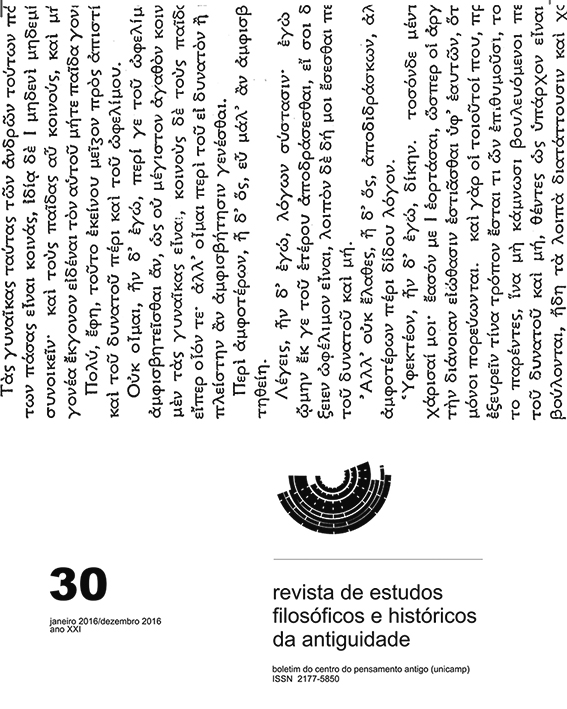Resumo
Este trabalho fez parte da apresentação realizada no XIII Colóquio do Centro de Pensamento Antigo (CPA) & IV Semana de Estudos Clássicos do CEC-IEL, ambos ocorridos em novembro de 2015 pelo Instituto de Estudos da Linguagem da Unicamp. Seu intuito era demonstrar o motivo pelo qual Boudica foi escolhida no século XIX como um dos símbolos nacionais da Inglaterra e como essa escolha estava ligada à corrida e às atividades femininas que se enquadraram no início do levante do movimento feminista durante esse período.Boudica foi uma rainha bretã da tribo dos iceni que liderou um exército contra o Império Romano no século I d.C. Seus atos inspiraram tanto as mulheres poderosas da Inglaterra, tais como Elizabeth I e Vitória, quanto as sufragistas do início do século XX, bem como as de épocas posteriores. Ela também esteve associada a um período de extremo nacionalismo para o Reino Unido, tendo em vista que sua figura estava diretamente relacionada com as raízes e glórias do passado desse grupo.
Referências
ALDHOUSE-GREEN, M. 2006. Boudica Britannia. London: Pearson Long-man.
ALEXANDER, W. 1779. The history of women, from the earliest Antiquity to present time. 2 vols, II, p. 336.
AUSTEN, J. 1813. Pride and prejudice. London: T. Egerton.
BÉLO, T. P. 2014. Boudica e as facetas femininas ao longo do tempo: nacionalismo, feminismo, memória e poder. Doutorado apresentado no programa de pós-graduação do Instituto de Filosofia e Ciências Sociais da Universidade Estadual de Campinas. Departamento de História, especialização em História Cultural.
BRISTOL, E. C. 1777. The laws respecting women: as they regard their natu-ral rights or their connections and conduct. London: J. Johnson.
CANDAU, J. 2011. Memória e identidade. São Paulo: Contexto.
COLLEY, L. 1996. Britons: forging the nation, 1707 – 1837. London: A Vintage Book.
COWPER, W. 1792/1980. Boadicea: an ode. In: J. D. Baird and C. Ryskamp (ed.) The poems of William Cowper, Oxford, Clarendon Press. 1:1748 – 82, 431 – 32.
CUDD, A. E. & Andreasen, R. O. 2005. Feminist Theory. Oxford: Blackell Publishing.
DAVIES, J & Robinson, B. 2009. Boudica: her life, times and legacy. Cromer: Poppyland Publishing.
FIELDS, N. 2011. Boudicca’s rebellion AD 60 – 61: the Britons rise up against Rome. Oxford: Osprey Publishing.
GISBORNE, T. 1797. Enquiry into the duties of female sex. London: T. Candell Jun and W. Davies.
GREEN, O. 1997. The town hall: Colchester. Colchester: Colchester Borough Council and Jarrold Publishing.
HALBWACHS, M. 1925/1994. Les cadres sociaux de la mémoire. Paris: Albin Michel.
HALBWACHS, M. 1996. A memória coletiva. São Paulo: Vértice.
HALBWACHS, M. 2004. The collective memory. New York: Harper & Row Publishers.
HEYWOOD, T. 1640. The exemplarary lives and memorable acts of nine the most worthy women in the world. London: Thomas Cotes.
HINGLEY, R. 2000. Roman officers and English gentlemen: the Imperial ori-gins of Roman archaeology. London: Routledge.
HOBSBAWM, E & Ranger, T (eds.). 1983. The invention of tradition. Cambri-dge: Cambridge University Press.
HOLINSHED, R. 1577/1586. The chronicles of England, Scotland and Ire-land. Newlie Augemented and continued by John Hosker + V. Gent and others. Place of publication and publisher unspecified. Firs published 1577.
LOW, S. M. 2002. Antropological-Ethnographic methods for the assessment of cultural values in heritage conservation. In: Torre, M. de la (ed.). As-sessing de values of cultural heritage. The J. Paul Getty Trust: Los An-geles.
PINTO, R. 2011. Duas rainhas, um príncipe e um eunuco: gênero, sexualidade e as ideologias do masculino e do feminino nos estudos sobre a Bretanha Romana. Tese de doutoramento apresentada ao Programa de pós-graduação do Instituto de Filosofia e Ciências Humanas da Universidade Estadual de Campinas. Departamento de História, área de concentração em História Cultural.
SILBERMAN, N. 2015. Remembrance of things past: Collective Memory, Sensory Perception, and the Emergence of New Interpretive Paradig-ms. In: Proceedings of 2nd International Conference on best practice in World Haritage: people and communities. Monarca, Spain, 29 – 30 Abril, 1 - 2 May.
SPEED, J. 1611. The history of Great Britaine under the conquests of ye romans, saxons, danes and normans. London: Iohn Sudbury & Gorg Hunble.
THOMAS, J. 1999. A materialidade e o social. In: Revista do museu de arque-ologia e etnologia. São Paulo, Suplemento 3: 15 – 20.
VANDYKE, R. M. & Alcock, S. E. 2003. Archaeologies of memory: An in-troduction. In: Archaeologies of memory. Edited by Van Dyke, R. M. & Alcock, S. E. Malden: Blackwell Publishers.
WEBSTER, J. 1978. Boudica: the British revolt against Rome AD 60. London: Batsford.
WOLLSTONECRAFT, M. 1792. A vindication of the rights of woman. Boston: Peter Edes.

Este trabalho está licenciado sob uma licença Creative Commons Attribution-NonCommercial-NoDerivatives 4.0 International License.
Copyright (c) 2017 Revista de Estudos Filosóficos e Históricos da Antiguidade
